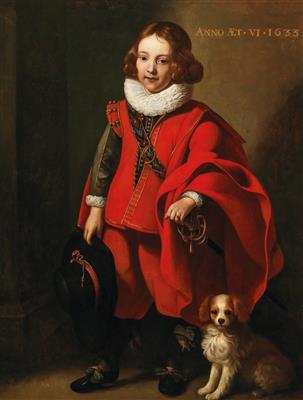Luigi Miradori, il Genovesino

(Genoa circa 1600/10–1656/7 Cremona?)
Portrait of a young noble, aged six,
inscribed and dated upper right: ANNO AET.VI.1633,
oil on canvas, 124 x 96 cm, framed
We are grateful to Filippo Maria Ferro for confirming the attribution on the basis of a photograph.
Miradori was born in Genoa, from which his moniker ‘il Genovesino’ derived, but was trained in the Milanese tradition of Morazzone, Tanzio da Varallo and Francesco del Cairo. His naturalistic rendition of detail and subtle use of light display the influence of Caravaggism. He was also stylistically indebted to Spanish artists, whose works were well known in Lombardy, which was then under Habsburg rule.
Miradori was first documented in Genoa in 1630 before he moved to Piacenza, and then Rome before finally settling in Cremona in circa 1640. There, he produced numerous paintings for the prominent religious orders such as his first known Cremonese work, dated 1640, of the Immaculate Conception in the Church of Castelleone. Other such works include paintings for Cremona Cathedral, San Lorenzo, Santa Maria Magdalena, Santa Marcellina, San Imerio and the churches of Soresina and Casalbuttano. Miradori also had secular patrons such as Don Alvaro de Quiñones, the Spanish governor of the city, who sent Miradori’s paintings to Spain for the king. In the late 1640s and early 1650s, he produced further religious works in Lombardy, including Milan.
Specialist: Mark MacDonnell
 Mark MacDonnell
Mark MacDonnell
+43 1 515 60 403
mark.macdonnell@dorotheum.at
08.06.2021 - 16:00
- Estimate:
-
EUR 40,000.- to EUR 60,000.-
Luigi Miradori, il Genovesino
(Genoa circa 1600/10–1656/7 Cremona?)
Portrait of a young noble, aged six,
inscribed and dated upper right: ANNO AET.VI.1633,
oil on canvas, 124 x 96 cm, framed
We are grateful to Filippo Maria Ferro for confirming the attribution on the basis of a photograph.
Miradori was born in Genoa, from which his moniker ‘il Genovesino’ derived, but was trained in the Milanese tradition of Morazzone, Tanzio da Varallo and Francesco del Cairo. His naturalistic rendition of detail and subtle use of light display the influence of Caravaggism. He was also stylistically indebted to Spanish artists, whose works were well known in Lombardy, which was then under Habsburg rule.
Miradori was first documented in Genoa in 1630 before he moved to Piacenza, and then Rome before finally settling in Cremona in circa 1640. There, he produced numerous paintings for the prominent religious orders such as his first known Cremonese work, dated 1640, of the Immaculate Conception in the Church of Castelleone. Other such works include paintings for Cremona Cathedral, San Lorenzo, Santa Maria Magdalena, Santa Marcellina, San Imerio and the churches of Soresina and Casalbuttano. Miradori also had secular patrons such as Don Alvaro de Quiñones, the Spanish governor of the city, who sent Miradori’s paintings to Spain for the king. In the late 1640s and early 1650s, he produced further religious works in Lombardy, including Milan.
Specialist: Mark MacDonnell
 Mark MacDonnell
Mark MacDonnell
+43 1 515 60 403
mark.macdonnell@dorotheum.at
|
Buyers hotline
Mon.-Fri.: 10.00am - 5.00pm
old.masters@dorotheum.at +43 1 515 60 403 |
| Auction: | Old Master Paintings I |
| Auction type: | Saleroom auction with Live Bidding |
| Date: | 08.06.2021 - 16:00 |
| Location: | Vienna | Palais Dorotheum |
| Exhibition: | 29.05. - 08.06.2021 |
